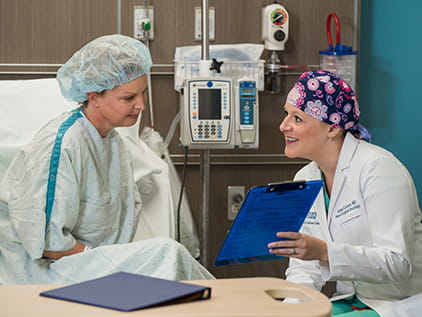Mohs Skin Cancer Surgery
Skin cancer is the most common type of cancer found in both men and women in the United States. Mohs surgery is a specialized procedure for removing cancerous growths of the skin. The goal of Mohs surgery is to ensure that cancerous cells are removed completely and to reduce or eliminate the chance of future growths.
The multidisciplinary team at The University of Kansas Health System has extensive experience treating thousands of people with skin cancer. Mohs surgery is just one of the techniques used to provide comprehensive and compassionate care for our patients.
What is Mohs surgery?
Mohs surgery is a minimally invasive procedure used to treat skin cancer. It was originally developed by Frederic E. Mohs, MD, in 1936 and has a long history of success as a cancer treatment. Mohs surgery can be performed in an outpatient clinic with local anesthesia and has a high rate of success. The cure rate is approximately 99% for most skin cancers that have never been treated.
During the procedure the cancerous lesion or tumor itself is not only removed, but successive areas of the skin around the lesion are also removed. Each time a layer of skin around the site of the growth or lesion is removed, it is analyzed for the presence of cancer. Once a layer of the skin shows no signs of cancer, the removal process ends.
We offer a variety of appointment types. Learn more or call 913-588-1227 to schedule now.
Who can have Mohs surgery?
Mohs surgery may not be appropriate for every skin cancer, but is highly effective for many skin cancers including:
How does Mohs surgery work?
Mohs surgery works by completely removing all cancerous cells from the affected area of the skin. This is achieved through a gradual reduction of the affected area based on careful microscopic analysis of successive removals.
This technique allows for the complete removal of cancerous tissue while removing as little healthy tissue as possible. People who have Mohs surgery can typically expect better outcomes in terms of healing and scarring.

Cancer care you can count on
The University of Kansas Cancer Center is 1 of fewer than 60 NCI-designated comprehensive cancer centers in the nation, and it's part of The University of Kansas Health System.
Benefits and risks of Mohs surgery
Mohs surgery is considered a lower-risk procedure because it is a minimally invasive procedure that can often be performed in an outpatient setting. People who have Mohs surgery do not typically require an overnight stay at the hospital.
Mohs surgery carries a number of benefits for those who receive it. It is extremely effective at curing skin cancers such as BCC and SCC and it leaves the smallest scar possible, limiting the need for skin cancer reconstructive surgery.
What happens during Mohs surgery?
Mohs surgery occurs in one sitting with progressive stages. First, the treatment site is examined and prepared for the procedure. The site is cleaned and the anesthetic is injected to numb the area.
In the next step, the surgeon will remove the top layer of the tumor using a scalpel. This will allow further examination of the tumor to see how deep it has penetrated into the skin. The patient is bandaged and can relax while the tissue is analyzed.
The doctor uses this removed tissue to build a map of the tumor. The removed tissue is frozen and sliced into layers then examined under a microscope. Using dye, the doctor is able to map out areas where cancerous tissue is still present.
Another layer of skin is removed based on this map and analyzed further. This process repeats until the surgeon is confident all cancerous cells have been removed.
Afterward, the wound arising from the treatment can be closed with a bandage, stitches or even a skin graft, depending on its severity. In some cases, post-Mohs reconstructive surgery may be required to restore an unblemished appearance.
Why choose us for Mohs surgery
Mohs surgery is a highly sought-after, specialized dermatologic surgery to remove malignant tissue and avoid extensive surgery, wide incisions or skin flaps. The procedure is very technically challenging and requires a high level of skill.
At The University of Kansas Health System, we offer the experience of fellowship-trained, board-certified physicians as part of your care team. The Mohs surgery specialists at the health system have completed thousands of successful Mohs procedures.
In certain cases, our health system provides immediate reconstructive surgery in tandem with Mohs surgery to ensure the best cosmetic result. Our streamlined referral process ensures that you have access to the reconstructive surgery experts you need as quickly as possible.
Our dermatology program is nationally recognized and offers innovative tests and treatments, a comprehensive care model, transplant dermatology and psoriasis treatment, so you can trust you're receiving the best care available.

Find a doctor
Doctors at The University of Kansas Health System are care providers and researchers at the forefront of new medical discoveries. From primary care to complex conditions, we offer hundreds of specialists.




